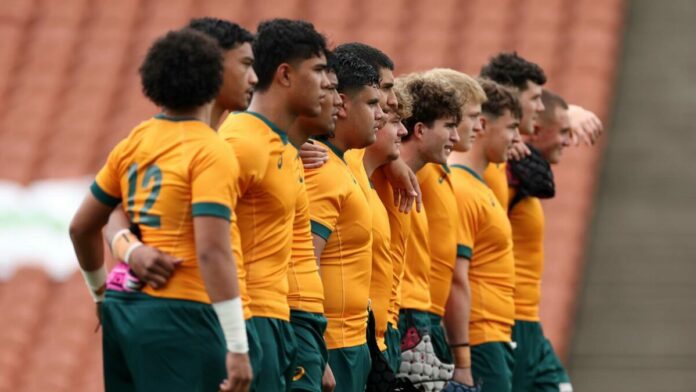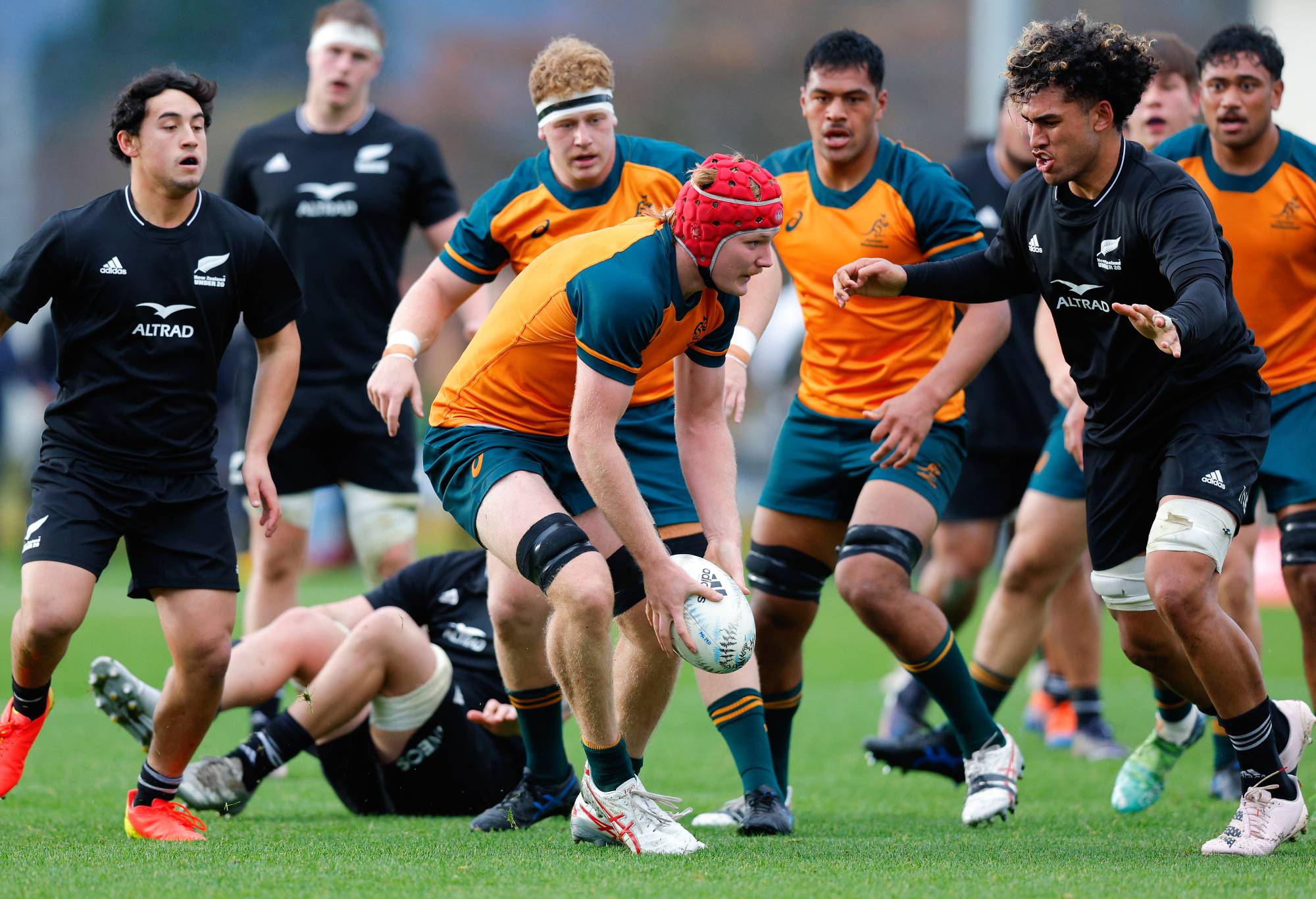
[ad_1]
A
Set small text size
A
Set the default text size
A
Set large text size
Professional rugby has been a young man’s game in Australia for a while now but the success of academy-focussed programs has seen a younger age profile also trend across European competitions in recent years. The Premiership in England is the latest to come to the party, with a number of players who’ve recently graduated from their U20s playing significant roles for their clubs, where in years gone by they would likely still be in development leagues. There’s probably an element of financial pressure forcing Prem teams to look within, but the quality of performance from these young tyros pushes that narrative to the side.
Swinging the focus back our way, it’s not like Australia is a trend-setter for the right reasons in this regard, as it often looks like we choose to promote young talent to fight off other codes rather than because they’re ready for the step up. This unfortunately may well be a necessary evil given our development player wages aren’t as attractive compared to rival codes. The financial disparity means we need to get better at identifying and investing in prospective Wallabies at a younger age, so we can keep the Joe Walsh’s that are more rugby than league but still get lured across.
This approach rubs a lot of people the wrong way due to a belief that the latter half of one’s teenage years is too early to be making good decisions about a player’s prospects. Moreover, there’s a perception that little accommodation is made for late bloomers in a system that focuses on early investment. It seems to me, however, that the French, Irish and now the English have a pretty good idea who their next crop of senior internationals are by the time they graduate from their U20s programs to no obvious detriment or, as they’re otherwise fond of saying in rugby league circles, without screwing the pooch.
So while we often see 18-20 year olds play Super Rugby in Australia, the difference in Europe is their academy programs are seemingly producing 19-20 year olds that are better physically prepared for the step up to their premier competitions and the longer season allows a more gradual introduction to help acclimatisation. It no doubt helps that their best academy prospects typically go straight from school into professional development leagues, while ours can end up playing for largely amateur local clubs prior to Super Rugby.
The good news is a lot of work has been done in recent years by Rugby Australia to address this through the introduction of the U16s and U19s comp as well as the Rugby Championship U20s. These are fantastic initiatives that map out the pathway for aspirational professional players better than ever and provide opportunities for our Super teams to better stress test their player pipeline.
The work is never done though, so with some financial freedom closer at hand thanks to the imminent Lions tour, here are a few things I would like to see Rugby Australia allocate resources towards in 2025/26.
U16s international fixtures
Rugby has always prided itself on being an international game and it’s along these lines that the U16s can be used to make our first pitch to the highly sought-after dual code athletes. Trans-Tasman fixtures at this age are the low-hanging fruit, but I would go one step further and approach South Africa as well to see if an U16s Tri Nations could be organised. The interest in junior rugby is huge in SA, so maybe if the NZ and Australian teams were to play the likes of Grey College or Paarl in the lead-up, there would be enough broadcaster or spectator interest to help the travelling sides break even. Maybe not, but it’s worth exploring.
Roar editor Christy Doran made the trip to Seattle with VisitSeattle.org, diving into the city’s electric sports vibe, outdoor adventures, and renowned food scene. Click here for his latest adventure in the Emerald City.
U18s UK tours
For those that aren’t aware, some years back Rugby Australia decided to implement their own U18s program as opposed to continuing with the Australian Schools Association run team. The positive byproduct of this delineation is we now have two squads getting high-level games and there seems to be a nice little progression building where some of the better U17s players will be selected for the Schools team one year, then potentially graduate to the U18s team the following year.
One of the great initiatives of the Australian Schoolboys in years gone by was the UK tours at the end of the calendar year. Longer tours at that age build the all-important rugby buzzword “cohesion”, so a return to these tours for our U18s would be a good bit of business and I could see the home nations coming to the party to help with some of the costs much like the recent Aus A tour.
Australia line up during the match between Australia U18s and New Zealand Schools. (Photo by Fiona Goodall/Getty Images for Rugby Australia)
Extended U19s competition
As mentioned earlier, this competition is a fantastic way for Super programs to health check their player pipeline. With a Super AU, the odds-on favourite to run in 2025 after local club competitions have finished, I’m hoping there is room in the calendar for it to be a home-and-away series and the U19s competition extended to match. Given it will be some of these boys’ first real footy season of proper length, care would need to be taken so they don’t play too many minutes or miss out on a valuable pre-season of physical development.
U20s season
This one gets a bit tricky because of the cost associated with keeping this squad together outside of the camps/tournaments, let alone these young blokes likely having jobs to go to and bills to pay, but it would be incredibly valuable for the team to play more fixtures in the lead-up to both the U20s Rugby Championship and the Junior World Cup each year. The England U20s recently announced they’ll play Cambridge and a Bath feeder team in the lead-up to their Six Nations title defence, which would see them having played close to ten high-level games before the World Cup if it goes ahead this year – double the preparatory games our lads currently get.

Lachlan Hooper of Australia in action during the match between New Zealand U20 and the Junior Wallabies. (Photo by Hagen Hopkins/Getty Images)
Our Aus equivalent could be based in Sydney for much of the first half of the year and get quality prep games against Shute Shield teams across February/March as well as fixtures against the Tahs or Brumbies A teams later on in the lead-up to the mid-year World Cup. The majority of the squad will have roots in NSW despite a good representation from each Super program, so bring back the good ol’ fashioned billeting system or call in a favour from boarding schools to house the remainder of the squad. Figure it out.
The fanbase is engaged when our teams go deep in these tournaments, as green shoots have been in short supply over the last couple of decades. Success at age grade level can also go a long way to ensuring our generation next take a winning mentality into future Wallaby teams, so let’s not shortchange ourselves on the front end.
A gentleman’s agreement
The reason I think a Super AU is an odds-on favourite to feature in the second half of the year is Rugby Victoria recently put out a pathways document that notes a senior Rebels team playing during the same window as the U16s and U19s for 2025.
If that is the case, it’s unlikely the Rebels team will be able to field a squad that can compete with Super Rugby programs minus their respective Wallabies so, unless Rugby Australia are going to bolster the Rebels through player relocation, there will need to be some sort of gentleman’s agreement to use the Rebels fixtures as a chance to blood fringe squad members along with a healthy contingent of clubland stock.
This kills two birds with one stone in that more club players around the country get exposed to a higher level of rugby and the best of the Victorian scene aren’t required to play at a level too far beyond them, where they won’t grow from the experience or be able to properly demonstrate their potential for higher honours.
The high-performance component of Rugby Australia under Peter Horne has made a lot of good noise about improving our pathways and despite barely having a penny to their name, still managed to somewhat walk the talk.
What they do once the organisation has a cleaner balance sheet will be instructive for the code’s long-term health.
[ad_2]
Copyright for syndicated content belongs to the linked Source link

